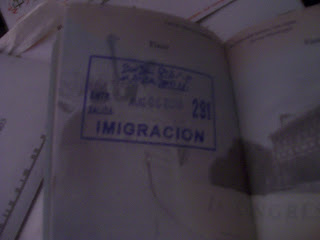I don’t go to many concerts. Haven’t paid for a concert ticket since 2006, in fact. I love music, but I tend not to get too obsessed with particular artists, so there aren’t that many concerts I would pay money for. Some, I think, are worth it; most aren’t. You often have to stand, if it’s at someplace like the Paradise, and have to suffer through one or two crappy opening acts. You fret over whether you should sing or dance along with the music, especially if you don’t know all the words by heart, and you glance around to see what other people are doing. You often can’t see very well, your ears are ringing when the concert is over, and half the time, you end up thinking that the artist sounds better on the CD. Or at least I do. It’s not the case for a lot of people, I know. Some people get an incredible natural high off of live music. They’re excited months in advance for a concert by an artist they love. They go to random concerts by artists they’re not familiar with just for the thrill of live music. They post on Facebook about how a certain (indie rock, of course) band opened their hearts and filled them, in those exact words. And while I kind of roll my eyes at that, I’m jealous of those people, too. I love listening to music, but I don’t get the huge spiritual boost from live music that some people seem to. I can’t accurately claim, either, that any music has ever changed my life or had a huge impact on me. It just doesn’t have the same effect on me.
It’s the same with religion. I’ve talked about my religious beliefs a bit here. While I do find religion comforting and benevolent, I’ve never had the kind of mind-blowing religious experience that some people talk about. I’ve read people’s writings about how religion—everything from Christianity to Buddhism to Islam to Orthodox Judaism to the Baha’i faith—changed their lives, gave them unspeakable joy, gave them whole new ways of looking at things. When people credit their faith for getting them through a tragedy or difficult life circumstance, or for giving them the strength to overcome addiction or some kind of self-destructive behavior, I marvel at the thought that religion could have that much power. While I respect religious beliefs and have my own, I’m not affected by religion to that degree.
Then there’s yoga, which I’ve gotten more into in the last year. I enjoy it, it’s shown me a better way to breathe, and I do feel a bit more relaxed after shavasana, at least more so than I would after any other form of exercise. (Some people say running gives them a great natural high, but although I run a lot myself, I can say with complete certainty that I have never felt that at all.) But my feelings on yoga are pretty similar to Sarah Bunting’s, who says “the taking of yoga so very, very seriously mystifies me.” When people say that yoga is life-changing, I have a hard time figuring out why. It’s not that relaxing. I was even at a party once where a girl said, completely seriously, “The world would be a better place if everyone did yoga.” That’s not just eye-rolling but seriously obnoxious—it’s like saying “The world would be a better place if everyone found Jesus.”
All of this does have a point, which I’m getting to. Last week, I went with a group of friends to see Wicked at the Opera House. I hadn’t seen a musical live in a long time, and I had almost forgotten what good musical theater does to me. I’ve seen Les Miserables twice, and both times, it put me in a good mood for the next week. But although I knew a couple of songs from Wicked and had read the (very different) Gregory Maguire book that it’s based on, I’d never seen Wicked before.
And holy shit. I started tearing up at least three times during the play. The storyline, which was a lot different from the book, was touching and surprising and occasionally funny. I’ve wanted to burst out singing all the songs since I saw them. I don’t often feel like music is “speaking” to me (and it would probably make me roll my eyes again if I heard someone said that), but there are a couple of songs in Wicked that I feel like I could sing about my own life. And this scene here? GOOSEBUMPS. Even more amazing in person.
[youtube https://www.youtube.com/watch?v=aAuWRE7FMf8]
I’m not a cynical person. I’m generally pretty positive and there’s a lot that I love. So I’m glad to know that even if I remain indifferent to live music, religion, yoga, etc., there is still something out there that I can find sublime, something can move me beyond the usual limits of my emotions.




